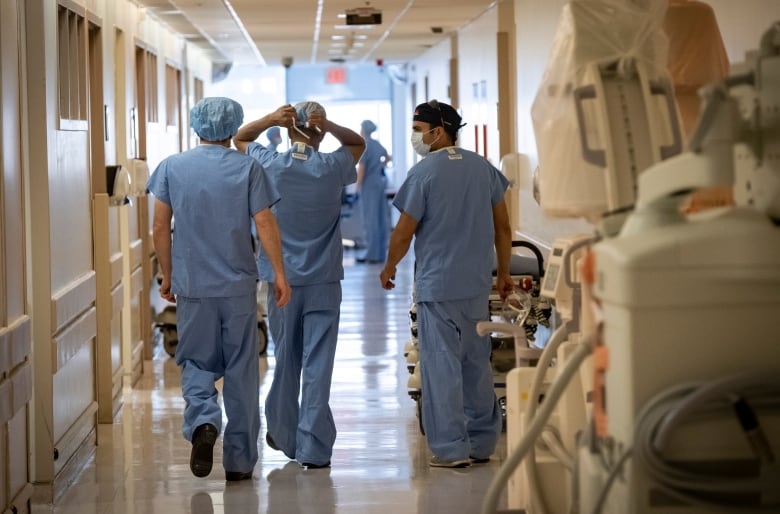Most provinces will no longer require masks in hospitals — but that could change if COVID levels worsen

COVID-19 mask mandates dropped in more hospitals
The majority of health-care facilities in Canada have dropped COVID-19 mask mandates, saying there’s less risk and virus spread. But they want to make clear no one is telling people not to wear masks, rather it isn't mandatory.
This is an excerpt from Second Opinion, a weekly analysis of health and medical science news emailed to subscribers. If you haven't subscribed, you can do that by clicking here.
Mask mandates are lifting in hospitals, long-term care homes and other health-care facilities across the country, marking an end to some of the last remaining public health restrictions against COVID-19 in Canada.
British Columbia and Saskatchewan are the latest provinces to lift universal mask mandates in health-care settings, while most other provinces have either previously removed them, left them up to individual hospitals to decide, or will likely soon follow suit.
But what changes for patients and health-care workers may not be clear-cut, as the lifting of mandates doesn't mean an end to masking altogether — and health officials stress that mandates could return to health care in the future, if COVID levels take a turn for the worse.
"Clearly masks are important in health-care settings, we've used them always, and I've been a big supporter of mask wearing when it's appropriate," Dr. Bonnie Henry, B.C. provincial health officer and chair of the council of chief medical officers of health, told CBC News.
"Nobody is telling you not to wear a mask, what we're saying is it's no longer mandatory by a provincial health officer order that everybody do it all the time."
Canadians can expect many areas of hospitals to still encourage masking in emergency rooms and departments with particularly vulnerable patients, like burn units and cancer wards — and health-care workers will still likely wear them in many patient-facing settings.
"If you want to or your provider wants to, masks will certainly be available. So I think it's going to be a gradual transition," Dr. Saqib Shahab, Saskatchewan's chief medical health officer, told CBC Saskatchewan last week.
"We really hope outbreaks won't rise as a result of this policy … but it's something that I think all of us have a role to play in minimizing that risk."
But reaction to the policy change has been mixed, with some health-care worker unions and advocates arguing the move will shift public health responsibilities onto individuals and could even equate to a violation of human rights for high-risk patients.

Lifting mandates could reduce health-care burnout
Part of the reasoning behind the shift in policy is to remove the need for health-care workers, who have faced severe burnout throughout the pandemic, to constantly mask in every area of the hospital — while also still allowing them the freedom to continue to do so.
"We know that most of our staff, when they got infected, weren't getting infected at work, they were getting infected in the community," said Dr. Michael Gardam, an infectious disease specialist and CEO of Health P.E.I.
"And so really the time has kind of come and gone for this and we need to get to a new state where we are masking when we need to — but not routinely, everyday, everywhere."
Dr. Alon Vaisman, an infection control physician at Toronto's University Health Network (UHN) and assistant medical professor at the University of Toronto, said removing universal mask mandates in all health-care settings would likely help to ease health-care worker burnout.
"I absolutely see the reasoning there, because it seems like a very low-risk manoeuvre. I think it's important to recognize that if you take health-care workers, for example, they've been working extremely hard the last three years," he said.
"And if there's anything we can do to try to alleviate the stress, if you could remove masking where it's no longer necessary and where the risk is extremely low, I think if you could do that it's very helpful to reduce burnout."

Mask mandates lifted at Sask. Health Authority facilities
Mask mandates at Saskatchewan Health Authority facilities have been lifted.
Dr. Amesh Adalja, an infectious disease physician and senior scholar at the Johns Hopkins Center for Health Security in Baltimore, said hospitals should be able to independently set policies on masking depending on local COVID levels and expert advice.
"When you're talking about non-patient facing activities, I don't think that there's much benefit in having masks in place," he said.
"There is benefit in patient-facing activities to having people wear masks, but I think it's something that each hospital needs to make a determination on based on the local metrics and not really something for the government to necessarily be involved in."
Alberta is still requiring masks in patient-facing settings, Quebec and Ontario are leaving masking rules up to individual hospitals, while Manitoba has opted to still require masks in health-care settings for the time being.
"If you're in an immunocompromised-facing service, these policies make sense," said Dr. Abraar Karan, an infectious diseases fellow at Stanford University and physician and researcher in Stanford, Calif.
"Now whether we should keep mask mandates in place at all hospitals, for all patients, in all services, that's more debatable."

Ethical debate over removing mask mandates in hospitals
B.C.'s Human Rights Commissioner Kasari Govender raised concerns about the decision to lift mandatory masking in health-care settings, saying they are the one space vulnerable people should be able to rely on to prioritize their safety — particularly in long-term care facilities.
"The removal of mask mandates has a disproportionate impact on marginalized people, seniors, and those who are clinically extremely vulnerable," Govender said in a statement this week.
"This represents a violation of their rights to equal participation in our communities."

B.C. lifts mandatory masking in health care and proof of vaccination for long-term care visitors
B.C. is ending its universal mask mandate in health care settings, Provincial Health Officer Dr. Bonnie Henry announced Thursday. Visitors to long-term care and assisted living facilities will also no longer need to show proof of a COVID-19 vaccination.
The Canadian Union of Public Employees, which represents over 200,000 health-care workers across the country, said in a statement to CBC News it's not acceptable for governments to allow employers to "download workplace safety onto front-line workers."
"That ignores the fundamental responsibility of employers to provide a safe work environment," CUPE's National President Mark Hancock said.
"Leaving the decision over infection controls in the work environment to individual employees is never okay. It's especially concerning in a health-care setting where people are already ill and at risk."
Vaisman said the overall benefit derived from universal mask mandates in all health-care settings at this point in the pandemic isn't as strong as it once was.
"What we've seen throughout the pandemic is that the morbidity and mortality associated with COVID, the likelihood that you'll be admitted to hospital if you get COVID, has substantially fallen over the last few years," he said.
"Our primary objective is always to keep patients safe … but it's important to recognize that the risk to patients has dramatically changed over the last few years because of vaccination, because of previous infection, because of therapeutics."

Vaisman said masking will remain in all traditionally high-risk areas in UHN hospitals, and patients entering emergency departments will still need to mask up — but fewer people will likely be wearing them in common spaces such as lobbies, hallways and elevators.
"So in certain settings where we think the risk is lower, you won't see health-care workers masked as often as you did in the past," he said. "I think the Canadian public will start to notice that masking is becoming less and less common in health-care settings."
Henry said the changing COVID landscape has led to a decreased need for universal masking policies, much like the shift away from mask mandates in the public last year.
"We no longer need that additional level of protection all the time, because of what we're seeing with the epidemiology in the community and our health-care settings — we don't have any outbreaks in long term care right now of influenza or COVID [in B.C.]," she said.
"So the setting is different and we need to adapt to that, we need to get back to a more normal way of interacting."

Mask mandates could return if COVID levels worsen
Canada avoided a severe winter COVID-19 wave despite a lack of most of public health restrictions, a busy indoor holiday season and a rapidly mutating virus — largely thanks to high levels of hybrid immunity from vaccination and prior infection.
A Canadian study of health-care workers in Quebec published in The Lancet Infectious Diseases in January found that two doses of an mRNA vaccine and a previous Omicron infection offered substantial protection against future infection from Omicron subvariants.
Bivalent vaccines, which were designed to target the BA.4 and BA.5 Omicron subvariants, were also associated with a lower risk of severe infection with several later members of the Omicron family, researchers wrote in new correspondence in the New England Journal of Medicine.
But COVID hospitalization levels still remain stubbornly high in Canada, with 3,268 hospital beds occupied by COVID patients across the country according to the latest federal data, despite continuing to gradually decline since mid-January.
"We're not done with this yet. COVID is going to be around and it's an additional infection that is causing illness — particularly in older people, particularly in people who have immune-compromising conditions," Henry said.
"It's going to be really important when we get to next respiratory season, that we'll be looking again at whether universal masking through that period of time when the risk is high, not just for COVID, but for influenza, for RSV, for other respiratory viruses as well."
Gardam said that while it makes sense to lift mask mandates in hospitals for now, a worsening situation with COVID or other respiratory illnesses later could change that.
"If we have a large outbreak of influenza or RSV or COVID in the future as we get into the winter seasons, I think it'll be quite reasonable to bring back masking in hospitals in certain areas, then taking it away again when the epidemiology suggests that it's safe," he said.
"There's no doubt masks had benefit during the pandemic, along with the other pandemic control measures that we had … we need to figure out what that middle ground is."

Add some “good” to your morning and evening.
A variety of newsletters you'll love, delivered straight to you.
*****
Credit belongs to : www.cbc.ca
 MaharlikaNews | Canada Leading Online Filipino Newspaper Portal The No. 1 most engaged information website for Filipino – Canadian in Canada. MaharlikaNews.com received almost a quarter a million visitors in 2020.
MaharlikaNews | Canada Leading Online Filipino Newspaper Portal The No. 1 most engaged information website for Filipino – Canadian in Canada. MaharlikaNews.com received almost a quarter a million visitors in 2020.







